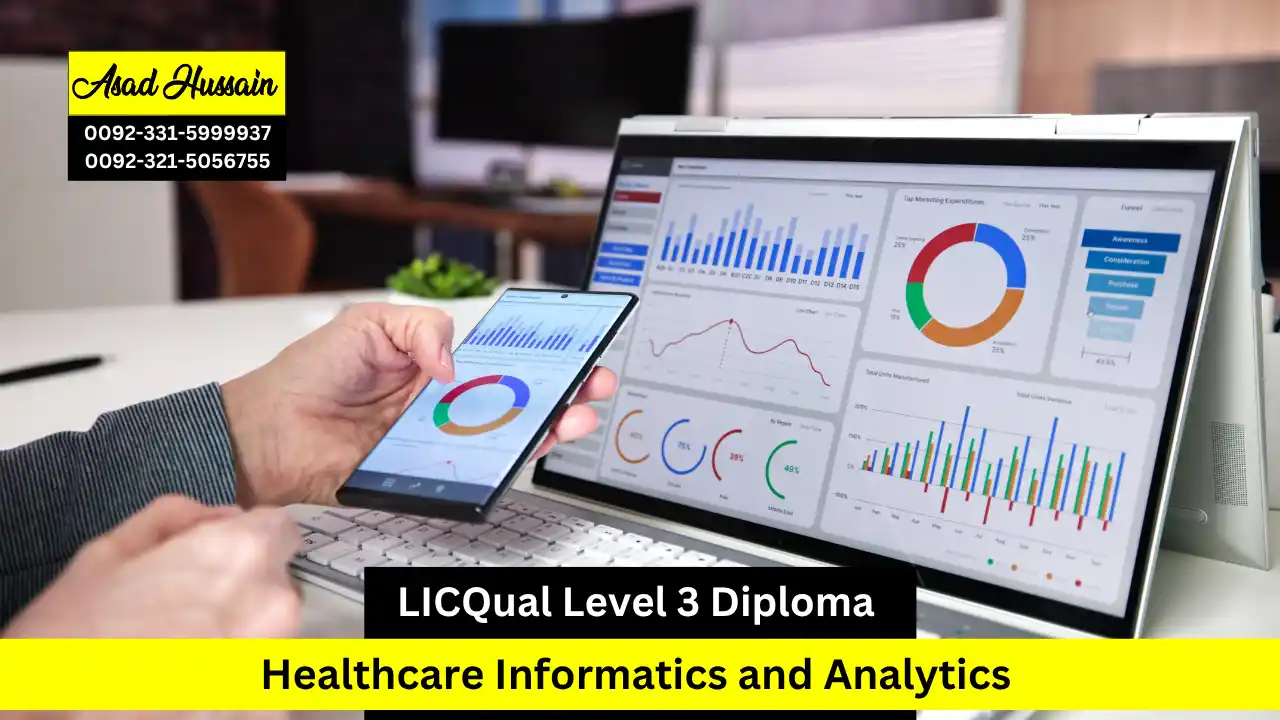The LICQual Level 3 Diploma in Healthcare Informatics and Analytics is a career-focused qualification designed to equip learners with the knowledge and skills to harness data for better decision-making in healthcare. In today’s digital age, healthcare organizations depend on accurate information systems and advanced analytics to enhance patient care, improve efficiency, and reduce risks. This diploma Healthcare Informatics provides the expertise required to bridge the gap between healthcare services and technology, preparing learners for professional roles where data-driven strategies are crucial to success.
LICQual Level 3 Diploma in Healthcare Informatics and Analytics is to introduce learners to the principles of healthcare information systems, health data management, and analytical tools used in modern healthcare environments. The course Healthcare Informatics emphasizes the integration of digital health solutions, clinical data, and statistical methods to improve patient outcomes and organizational performance. By mastering these concepts, learners gain the ability to interpret healthcare data effectively, manage electronic health records, and support informed decision-making processes within hospitals and healthcare facilities.
Throughout this Healthcare Analytics Course, learners will develop practical skills in collecting, analyzing, and presenting health data using industry-relevant methods. The program Healthcare Informatics also focuses on healthcare data security, governance, and compliance, ensuring learners are capable of handling sensitive patient information responsibly. Real-world case studies and applied projects give students hands-on experience with healthcare informatics tools, preparing them to work confidently in both clinical and administrative environments.
One of the key strengths of this Healthcare Informatics Diploma lies in its focus on the practical applications of analytics in healthcare. Learners will gain competencies in using health information technologies, applying predictive analytics, and developing evidence-based strategies to address healthcare challenges. These skills are vital for those aspiring to careers in healthcare management, data analysis, clinical support systems, and digital health innovation. By combining theoretical knowledge with practical learning, the diploma ensures graduates are workplace-ready.
Upon completing the LICQual Level 3 Diploma in Healthcare Informatics and Analytics, learners will be fully prepared to contribute to healthcare efficiency, patient safety, and innovation. This qualification also opens pathways to advanced studies in healthcare management, public health, and data analytics, making it an ideal choice for career-driven individuals. Graduates will be positioned for roles in healthcare administration, data analysis, health IT, and digital healthcare leadership, enabling them to make meaningful contributions to modern healthcare systems worldwide.
Program Highlights
Mandatory Units
- Introduction to Healthcare Informatics
- Healthcare Data Collection and Management
- Data Analytics and Statistical Methods in Healthcare
- Healthcare Decision Support Systems
- Digital Health Technologies and Innovation
- Practical Applications of Healthcare Informatics and Analytics
The LICQual Level 3 Diploma in Healthcare Informatics and Analytics is designed for individuals aspiring to develop expertise in healthcare information systems, data analytics, and digital health solutions, while building skills in leadership, data-driven decision-making, and organizational efficiency. To ensure learners are well-prepared for the academic and professional standards of this qualification, specific entry requirements are set to maintain the quality and integrity of the program.
Age Requirements
- Applicants must be at least 18 years old at the time of enrolment.
- Candidates under 18 may be considered only with written parental or guardian consent.
- Evidence of maturity and readiness for higher-level study must be provided in such cases.
Educational Requirements
- A minimum of a high school diploma (or equivalent) is required.
- Previous study in healthcare, IT, management, business, or social sciences is advantageous but not mandatory.
- Learners with prior exposure to healthcare administration or information systems will benefit from a stronger foundation.
Professional Experience
- While not compulsory, 1–2 years of experience in healthcare, IT systems, data analysis, or related fields is preferred.
- Practical exposure to healthcare operations or digital record-keeping enhances learner readiness.
- Experience in healthcare data management, electronic health records (EHRs), or analytics tools is considered beneficial.
English Language Proficiency
- Strong English reading, writing, and communication skills are essential for successful completion of the diploma.
- International applicants must provide proof of English proficiency through recognized assessments.
- IELTS with a minimum score of 5.5 or an equivalent qualification is required.
Learners who meet these entry requirements will be well-prepared to excel in the LICQual Level 3 Diploma in Healthcare Informatics and Analytics, gaining essential knowledge and skills to analyze healthcare data, manage information systems, and support informed decision-making. This qualification also serves as a progression pathway to advanced studies, such as the LICQual Level 4 Diploma in Healthcare Management, enabling learners to strengthen their professional development and recognition in the global healthcare sector.
The LICQual Level 3 Diploma in Healthcare Informatics and Analytics equips learners with vital knowledge, technical skills, and professional competencies required to manage healthcare information systems, analyze medical data, and apply digital health solutions to improve patient outcomes. In today’s data-driven world, healthcare organizations rely heavily on informatics and analytics to strengthen decision-making, streamline operations, and enhance patient safety. This diploma ensures learners develop the expertise to harness healthcare data, optimize digital resources, and support evidence-based strategies across healthcare environments. Upon completing this qualification, learners will demonstrate strong capabilities in health information management, data analytics, electronic health records (EHRs), and digital transformation practices to maintain operational efficiency and quality care.
Fundamentals of Healthcare Informatics and Analytics
- Understand the core principles, scope, and importance of healthcare informatics in modern medical systems.
- Explore the relationship between healthcare data management, patient outcomes, and organizational performance.
- Examine the role of analytics in clinical decision-making, operational efficiency, and cost management.
- Identify key technologies such as electronic health records, health information systems, and big data tools.
- Develop the ability to apply informatics and analytics concepts in real-world healthcare settings.
Health Information Systems and Data Management
- Learn techniques for managing healthcare data using structured and secure information systems.
- Understand data collection, storage, retrieval, and security protocols in line with healthcare standards.
- Analyze the role of interoperability and integration across healthcare IT platforms.
- Evaluate the impact of accurate and timely health information on patient care and safety.
- Develop skills in managing electronic health records (EHRs) and ensuring compliance with data regulations.
Healthcare Data Analytics and Evidence-Based Decision Making
- Gain in-depth knowledge of analytical methods, tools, and frameworks for healthcare data.
- Apply statistical and analytical models to identify patterns, risks, and opportunities in healthcare delivery.
- Monitor key performance indicators (KPIs) to measure the effectiveness of healthcare services.
- Evaluate the role of predictive analytics in disease prevention, patient safety, and cost reduction.
- Implement evidence-based decision-making strategies to improve healthcare quality and efficiency.
Policy, Governance, and Ethical Considerations in Health Informatics
- Examine healthcare policies and regulatory frameworks related to data protection and information governance.
- Understand compliance mechanisms such as HIPAA, GDPR, and other data privacy laws in healthcare.
- Develop effective strategies to address ethical challenges in data usage and digital health systems.
- Assess the role of governance in aligning healthcare informatics strategies with organizational goals.
- Promote accountability, transparency, and ethical standards in healthcare data management.
Communication, Leadership, and Team Coordination in Healthcare Informatics
- Learn effective communication techniques for presenting healthcare data insights to diverse stakeholders.
- Apply leadership strategies to guide healthcare teams in adopting digital tools and technologies.
- Develop frameworks for coordinating multi-disciplinary teams in healthcare IT and analytics projects.
- Strengthen problem-solving and critical thinking skills in data-driven healthcare environments.
- Cultivate adaptability, resilience, and digital literacy as essential leadership traits in healthcare informatics.
Digital Health Solutions, Innovation, and Professional Development
- Explore emerging trends such as telehealth, mobile health apps, AI, and machine learning in healthcare.
- Develop strategies for implementing innovative digital solutions to improve healthcare delivery.
- Apply monitoring and evaluation techniques to measure the effectiveness of healthcare IT systems.
- Strengthen professional competence in managing health informatics projects across diverse settings.
- Prepare for career progression and advanced qualifications in healthcare informatics, analytics, and management.
Upon completion of the LICQual Level 3 Diploma in Healthcare Informatics and Analytics, learners will be fully equipped with practical expertise, analytical skills, and leadership abilities to design and implement advanced healthcare data management and analytics strategies. Graduates will be prepared to contribute to safer, more efficient healthcare environments, improve patient care through data-driven decisions, and pursue advanced studies or leadership roles in digital health, healthcare management, and health information systems.
The LICQual Level 3 Diploma in Healthcare Informatics and Analytics is a globally recognized qualification designed for individuals who want to play a key role in transforming healthcare delivery through data-driven decision-making, digital health systems, and advanced analytics. In today’s rapidly evolving healthcare sector, organizations face growing challenges in managing patient information, adopting digital technologies, and leveraging data to improve patient outcomes. This diploma equips learners with the ability to analyze healthcare data, implement informatics solutions, enhance operational efficiency, and support evidence-based strategies that ensure high-quality care. It also emphasizes critical areas such as governance, ethical data use, and digital transformation to strengthen healthcare systems in the modern age. By completing this qualification, learners will be prepared to apply informatics and analytics to drive innovation, optimize resources, and support patient-centered care.
Healthcare Data Analysts and Information Managers
- Professionals directly responsible for collecting, managing, and interpreting healthcare data for decision-making.
- Individuals aiming to develop expertise in electronic health records (EHRs), clinical data management, and reporting tools.
- Learners who want to master healthcare analytics to identify trends, risks, and opportunities in patient care.
- Those seeking to improve efficiency through data-driven planning, resource allocation, and service optimization.
- Professionals determined to design and implement secure, compliant, and reliable healthcare information systems.
- Data managers looking to enhance their skills in reporting, performance monitoring, and system integration.
- Individuals aspiring to apply global best practices in healthcare informatics and analytics.
- Learners committed to improving patient outcomes through accurate and ethical data management.
Healthcare Practitioners and Administrators
- Doctors, nurses, paramedics, and allied health professionals seeking to expand their expertise into health informatics.
- Hospital and clinic administrators aiming to integrate digital health solutions into healthcare operations.
- Practitioners interested in applying evidence-based analytics to improve patient safety and care outcomes.
- Healthcare staff who want to build skills in data literacy and digital transformation in clinical settings.
- Professionals focused on strengthening their knowledge of healthcare IT systems and analytics platforms.
- Individuals committed to enhancing service quality through advanced reporting and patient information management.
- Administrators who want to align digital health strategies with organizational objectives and compliance requirements.
- Learners keen to adopt innovation-driven approaches in both clinical and administrative healthcare environments.
Supervisors and Team Leaders
- Leaders overseeing healthcare teams or projects who want to develop data-informed leadership skills.
- Supervisors aiming to improve their ability to interpret healthcare analytics for strategic planning.
- Team leaders responsible for ensuring the adoption of digital tools and technologies across healthcare systems.
- Professionals interested in coordinating IT, clinical, and administrative teams for better integration.
- Leaders who want to gain expertise in communicating complex data insights to non-technical stakeholders.
- Supervisors determined to strengthen their oversight in implementing digital health projects.
- Individuals seeking to develop resilience-focused leadership qualities to support organizational growth.
- Professionals aiming to create a culture of digital literacy and innovation within their teams.
Health IT Specialists and System Developers
- Professionals responsible for developing, managing, or implementing healthcare IT and digital health systems.
- IT specialists working to integrate secure and interoperable healthcare information platforms.
- Individuals aiming to advance their skills in health data security, compliance, and system optimization.
- System developers seeking to build user-friendly, reliable, and scalable healthcare informatics solutions.
- Learners focused on adopting emerging technologies such as AI, machine learning, and telehealth systems.
- Professionals who want to ensure healthcare IT infrastructure remains efficient and future-ready.
- Individuals committed to bridging the gap between clinical requirements and IT system capabilities.
- Health IT practitioners aspiring to align systems development with ethical, clinical, and global best practices.
Career-Focused Learners
- Individuals aspiring to progress into specialized roles in healthcare data analytics or informatics management.
- Learners seeking qualifications that provide pathways to advanced studies in healthcare IT or management.
- Career-driven individuals motivated to contribute to the digital transformation of global healthcare systems.
- Professionals looking to strengthen their credibility in healthcare informatics, data governance, and analytics.
- Learners committed to developing strong analytical and technical skills for modern healthcare environments.
- Individuals wishing to gain practical expertise in health informatics tools, data analysis, and system design.
- Career-focused professionals seeking to enhance employability in healthcare, IT, or public health sectors.
- Learners determined to take on leadership roles in building digitally advanced, data-driven healthcare organizations.
The LICQual Level 3 Diploma in Healthcare Informatics and Analytics is the perfect choice for learners passionate about achieving professional excellence in healthcare’s digital transformation. It provides in-depth knowledge, technical expertise, and advanced leadership competencies to effectively manage healthcare data, optimize information systems, and apply analytics for improved decision-making. Graduates will be well-prepared to make meaningful contributions to patient care, organizational efficiency, and healthcare innovation while pursuing rewarding careers in informatics, analytics, and digital health management.







